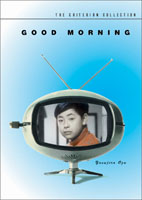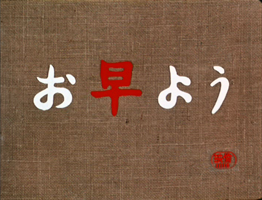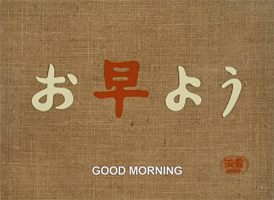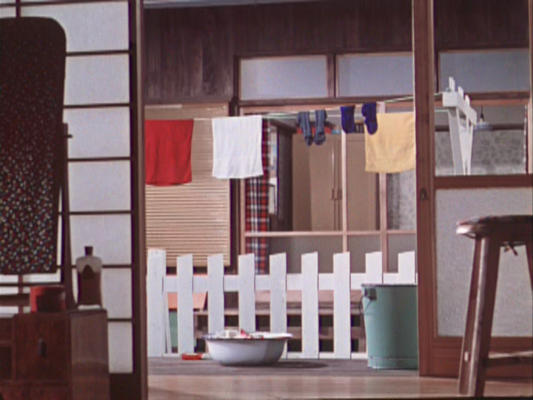2000: 
directed by Yasujirō Ozu
written by Kōgo Noda and Yasujirō Ozu


(Image on the left is from the Criterion DVD that I watched. Image on the right is from Criterion’s present-day streaming service with a restored copy of the film, which I have only discovered after the fact. Subtitles are burned right into the image but otherwise far superior, as you can see.)
Criterion #84: Good Morning.
お早よう = Ohayō = “Good morning.”
(Ohayō gozaimasu, literally “it’s early,” is the customary morning greeting; Ohayō is the more informal abbreviated version, essentially a specialized form of the word meaning “early.” This root word, “haya,” is the single red character 早 in the title card, so I’m guessing that its emphasis is natural, has no particular significance, and is just for visual effect.)
My first Ozu, though I already had a sense.
Composition, precision, control. Perpendiculars, rectilinear blocks of content. Mondrian. Technicolor palette: brown, white, black, light blue, small areas of strong red. High 1959.
The quadrilaterals make comfort possible. Frame as prerequisite for safety, feeling, humor, beauty. Marie Kondo / Ikea / Wes Anderson. Packaging as Pieter de Hooch. Quest object of the movie is a TV in a cubic cardboard box: comfort and joy, and beyond that, meditation and trance. “ASMR unboxing.”
Objects at the edge of the foreground; people at the center of the distant background. Space is framed along all 3 axes. Nested perspectives: sets within sets; boxes within boxes. My fantasies staring into Escher prints as a child.
Art that “teaches us how to look,” my misquote from John Armstrong. A vision of what domesticity is. Takes its place for me alongside other works of heartfelt suburbiana: Edward Scissorhands, A Christmas Story.
Great warmth and beauty for me in the charades scene. Comedy as a shared serenity. Resonates with my own wishes for how life should be, has been, is. “Cute kids” is too often something else substituted for the transcendent thing itself. Here for a moment is the thing itself. The same goes for “humor.”
The camera low to the floor, unmoving, direct, trustworthy, loving. A child watching raptly from the next room, taking in all, the purest possible gaze.
“I love you” / “Good morning” / 👌. The message of the movie: speech vs. truth. Silentium! Small talk vs. love / English lessons vs. the musical fruit itself. (“Did you call me?”)
Word vs. texture. Look at even the woven surface behind the title card. All the busy talk of the neighborhood gossips is no match for a tactile Ikea paradise. The sensory order reigns supreme; its spirit is unbreakable. As long as you can reach down and touch the carpet, all is well. I believe it.
The encroachment of the West as a flowering of innocence. Dire warnings about the boob tube are just so much “good morning,” the refuge of nervous grownups; they sing a different tune when they’re in a better mood. “Look at his face; I can see he doesn’t mean it.”
No need to fear the pajama-wearing hipsters and their TV set; jazz and English and hula hoops are just more sounds and colors to fill our cabinet of curiosities. Hedonism is not incompatible with order; childish things are not spiritually void. All of this new sensual absurdity is safe; Japan is ready to bear it in its heart. “I love you!”
The movie itself — simple, gentle, immediate, human — is what the meticulous construction has allowed. Elegant and quietly nourishing. A friendly film above all; for which, in a lonely moment, I was profoundly grateful.
There, that was a hundred times easier than usual! It’s the connective tissue that costs. That and the verbs.
Music by Toshiro Mayuzumi. A flashy concert composer and skilled orchestrator who perfectly understood what was called for. I wish I could have grabbed the main theme, the one that recurs many times throughout, because it’s the heart of the movie. Unfortunately it’s always interrupted by dialogue.
Here then is the splendid Main Title, with suggestions of Haydn, Rossini et al. but treated with sweet zaniness. (I don’t think it alludes to any specific classical work, but I’m not certain.)

Grateful. Wonderful. Comfort. Thank you. Arigato gozaimasu.
Now that I have watched the movie, I appreciate and enjoy your post even more.
A kettle to warm the hands on, a cushion to kneel on, rice and tea.
I love you!